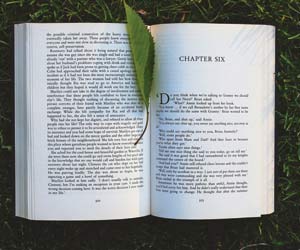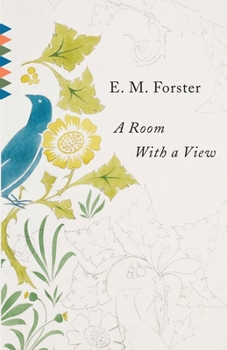A Room with a View
Select Format
Select Condition 
Book Overview
First published in 1908, A Room with a View portrays the love of a British woman for an expatriate living in Italy. Caught up in a world of social snobbery, Forster's heroine, Lucy Honeychurch, finds herself constrained by the claustrophobic influence of her British guardians, who encourage her to take up with a well-connected boor. In the end, however, Lucy takes control of her own fate and finds love with a man whose free spirit reminds her of "a...
Format:Paperback
Language:English
ISBN:0679724761
ISBN13:9780679724766
Release Date:October 1989
Publisher:Vintage
Length:242 Pages
Weight:0.63 lbs.
Dimensions:0.8" x 5.2" x 8.0"
Related Subjects
Classics Fiction Humanities Literature Literature & Fiction Oscar Nominated RomanceCustomer Reviews
8 ratings
Book is fine but not the format
Published by moopdragon , 8 months ago
I received the book printed in a workbook format. Not what I expected and not happy about it.
I ordered good condition but didn’t get that
Published by Chita rojas , 1 year ago
What I received was a book covered with old mold and ripped
Not the same book as the picture shown
Published by Emma , 4 years ago
I ordered this book thinking the hardcover would look like the picture and instead I got a hardcover version of the book that was just black and not with the picture and detail the image showed when ordering the book. Extremely disappointed....
A Breath of Fresh Air!
Published by Thriftbooks.com User , 19 years ago
What a relief! This was a short, simple, easy read that I truly enjoyed. The young and beautiful Miss Lucy Honeychurch, accompanied by her dear older friend Miss Bartlett, is first introduced to the reader in Florence, just arrived at the pension they will be staying at during the course of their holiday in Italy. The ladies are vexed to find that they have not received rooms with the views they wished for; overhearing them, an elderly man and his son offer to trade rooms with them, for they have rooms with perfect views; and hence the title of the book. This is when Lucy first meets George Emerson, an attractive, if not unconventional, young Englishman. Lucy encounters him again when she witnesses a public murder in the streets, and George attends to her after she faints. This is when his passion for her is first ignited. This inward flame is only stoked more when he and his father are accidentally invited on a daily outing with Lucy and her friends, and George sees Lucy alone in a field full of flowers, beautiful and surrounded by beauty. He cannot help but kiss her, which is entirely un-gentleman-like. Miss Bartlett witnesses George's display of affection, and decides that to keep her young companion's innocence safe from George's intentions, the two of them must leave immediately for Rome, without so much as a goodbye to George or his father, and stay with some family friends, the Vyses. The story opens up again in a quiet, small neighborhood in the country, with Miss Lucy Honeychurch engaged to Cecil Vyse, whom she became better acquainted with in Rome. Then, by mere coincidence--or is it fate?--George Emerson and his father, whom Lucy never expected to see again, reenter into her life, and complicate things. Should Lucy flout convention and follow her heart, which is leading her to George, or will she remain with Cecil, the safe and respectable choice, who she knows can never make her truly happy? Find out for yourself! Forster does a great job of painting with certain clarity and humor the scenes and characters of this story. This classic is a breath of fresh air, and I'm sure that even if you aren't a huge fan of British Literature, you will love it.
A delightful social satire.
Published by Thriftbooks.com User , 24 years ago
Concerning Lucy's passionate playing of Beethoven upon the piano, the Rev. Mr. Beebe once said, "If Miss Honeychurch ever takes to live as she plays, it will be very exciting--both for us and for her." At the time of the remark, Lucy is a very conventional young woman, with perhaps occasional rebellious thoughts. The Emersons, father and son, are somehow not quite acceptable in her social circle, and though George is so bold as to kiss her impulsively, she is determined to forget him. Instead she finally gives in to the repeated proposals of Cecil Vyse, a thoroughly fashionable young gentleman, if not very exciting. So the stage is set for this splendid satire on the English social strata of the early part of the 20th century, a time when the formal structure of the Victorian era was beginning to fray at the edges. Vyse is a delightfully drawn male chauvinist prig; nobody likes him, but everyone is willing to accept him, and Lucy convinces herself that she is in love with him. However, Vyse's own penchant for getting his way by playing rather cruel practical jokes brings the Emersons back into the picture. Confronted by the contrast between the not quite classy but intelligent, thoughtful (and bold) George Emerson and the arrogant, boorish, but elite Cecil Vyse, Lucy finally decides to live as she plays Beethoven, with exciting results. This early work of Forster's is a pure delight, with a light and well-controlled tone throughout. Although there would be a danger of stereotyping to illustrate the different social classes, Forster skillfully makes the characters well rounded and unpredictable, as in the scene when Lucy breaks her engagement to Vyse, expecting his feelings of masculine superiority to precipitate an argument, but instead being somewhat dismayed when he behaves as a perfect gentleman. Although HOWARDS END is usually rated above A ROOM WITH A VIEW, I prefer this slighter, but consummately well-done, novel.
Very entertaining
Published by Thriftbooks.com User , 24 years ago
I have long been a fan of Jane Austen and have become so spoiled by her wonderful writing and complex yet perfect sentences that I seldom find anything enjoyable by comparison. However, "A Room with a View" was one of the most wonderful non-Austen books I have ever read. I laughed out loud many times at the way Forster worded things, especially the chapter titles (eg. "How Ms. Bartlett's Boiler was so Tiresome"). At the beginning, he seemed to be making fun of his characters - at their simple-mindedness and lack of depth - but then he commenced to transform them (mainly Lucy) and make them into wonderfully admirable people. It seemed that justice was served to Cecil when he served as the means through which Lucy and George were finally united. I enjoyed every minute of this book but would recommend it only to those who would appreciate it and who would be reading it by choice.
A simple, yet complex book
Published by Thriftbooks.com User , 25 years ago
I don't think I've read anything so simple, yet complex. I could feel the author's own wrestling with the concept of immortal and soul love, and he so beautifully conveyed it this book. I've reread it twice, and keep finding little gems of beauty hidden in the lines. George and Lucy's need to be with each other to keep them away from the darkness in themselves is extremely powerful. In their merging, at the end, only then did they feel a sense of completeness and wholeness. Their obstacles in getting there were amusing and cathartic all at the same time. From the moment that Lucy witnessed the death of the Italian, life wasn't the same; the death signified a death within herself, and only through a love as deep as she had for George would she be able to understand the concept that love and death are very close together in feeling - the type of love that comes but once in a lifetime. A powerful book, masked as a light satiric period piece. Read it again and again to see all the layers of emotion!
An excellent book (and a great movie besides)
Published by Thriftbooks.com User , 25 years ago
I cannot recommend this book highly enough. Best of all, this is one of the very very few books to be made into a movie and come out unscathed, perhaps even improved in certain aspects. If you can't stand to take a chance and read it, see the film at least. Yes, the premise is somewhat similar to Madame Bovary. However, I found the difference between them to be that I hated Mme. Bovary and adored A Room With a View. To clarify, there is a part in the latter where Forster, discussing some sonatas of Bethoveen writes, "they can triumph or despair as the player decides, and Lucy had decided that they should triumph." Flaubert plays on the side of despair, while Forster, like his character, "loved to play on the side of Victory." All of the characters are vividly drawn. They speak as real people speak and act as real people act, or once did. The language and mores have changed since the Victorian era, but they are motivated by similar things to those that motivate people today and they are fully-developed. Forster has the knack of describing his characters in a few well-turned sentences that tell you all you need to know to picture them. They get themselves into situations you can believe, and they do not always act in their own best interests, just like real life. I have re-read this book several times over the past 10 years, and what strikes me is how much detail Forster managed to sneak in with out making the book feel weighted or heavy. It is a light read, and yet every time I pick it up to reread it I find some new passage I had overlooked previously, each lovlier than the one before. He also makes some very interesting philosophical statements, without bogging down plot or pacing. Forster was obviously influenced by the Transcendentalists (Emerson, Thoreau), one of the main characters is even named Emerson, so if they are of interest to you, this may be as well.
A Room with a View Mentions in Our Blog

Ode to Spring: 10 Books to Celebrate the Season of Renewal
Published by Ashly Moore Sheldon • March 20, 2020
Happy Spring! This is a time of renewal and rebirth, infusing us with hope in the form of burgeoning buds and fragrant breezes. Light lingers and birdsong fills our ears. Despite all else, the earth pulses with life and resilience. Here are ten books that celebrate the season.






